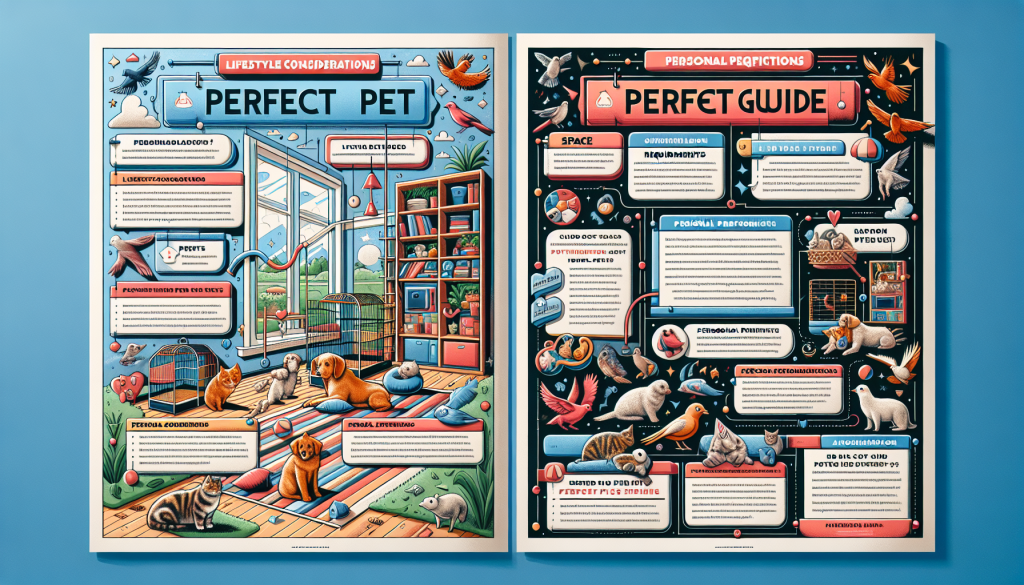Are you considering adding a furry friend to your family? Look no further! This beginner’s guide will help you navigate the world of pet ownership and find the perfect companion for you. From understanding different animal personalities to assessing your own lifestyle and preferences, we will provide you with valuable tips and insights to ensure a harmonious and fulfilling relationship with your new pet. Whether you’re a first-time pet owner or looking to expand your furry family, this guide is packed with all the information you need to make an informed decision and embark on a wonderful journey with your new four-legged friend.

Table of Contents
ToggleFactors to Consider Before Getting a Pet
Lifestyle and Schedule
Before getting a pet, it’s crucial to consider your lifestyle and schedule. Think about how much time and effort you can realistically dedicate to a pet. Are you a busy professional with long work hours, or do you have a more flexible schedule? Certain pets require more attention and exercise than others, so it’s important to choose one that matches your lifestyle and can fit into your daily routine.
Living Arrangements
Your living arrangements play a significant role in determining the type of pet that is suitable for you. If you live in a small apartment with limited space, a large dog may not be the best choice. On the other hand, if you have a spacious backyard, a dog might be a great option. Consider any restrictions in your living arrangement, such as pet policies, size limitations, or outdoor access that may influence your choice of pet.
Allergies and Health Conditions
Another crucial factor to consider is whether you or anyone in your household has allergies or health conditions that could be exacerbated by owning a pet. Some individuals may be allergic to specific types of animals or suffer from asthma, making it important to choose a hypoallergenic breed or a low-shedding pet. Be sure to consult with a medical professional if you have any concerns about allergies or other health conditions.
Budget Considerations
Owning a pet comes with financial responsibilities. Consider the costs associated with food, grooming, veterinary care, vaccinations, and any other necessary supplies or services. Different pets have varying expenses, so evaluate your budget and ensure that you can provide for your pet’s needs throughout its lifetime. Planning ahead and having a clear understanding of the financial commitment involved will help prevent any unexpected financial strain.
Types of Pets to Consider
Dogs
Dogs make fantastic companions, and there is a wide variety of breeds to choose from. They come in different sizes, temperaments, and energy levels, making it easier to find one that matches your lifestyle. Remember to consider factors such as exercise requirements, living space, and the amount of time you can dedicate to training and socialization.
Cats
Cats are independent yet affectionate pets that can adapt well to various lifestyles. They are known for their low-maintenance nature and are often a good choice for individuals with a busier schedule. However, keep in mind that cats still require attention, mental stimulation, and regular veterinary care.
Small Mammals
Small mammals like rabbits, guinea pigs, and hamsters can be excellent pets for individuals with limited space or allergies to fur. They are usually easier to care for, require less space, and have shorter lifespans compared to dogs or cats. However, each species has its specific requirements, so do thorough research before considering one as a potential pet.
Birds
Birds can make charming and intelligent pets, adding a touch of liveliness to your home. They come in various sizes and personalities, and each species has unique dietary and environmental needs. Keep in mind that birds require regular social interaction, mental stimulation, and appropriate housing to thrive.
Fish
Fish are a popular choice for those who want a low-maintenance and visually appealing pet. While they don’t require cuddles or walks, they do need a well-maintained aquarium, proper water conditions, and a suitable diet. Research different fish species to find one that suits your level of commitment and interest in maintaining a tank.
Reptiles and Amphibians
Reptiles and amphibians can be fascinating pets for those with a particular interest in these unique creatures. From turtles and snakes to geckos and frogs, there is a wide variety to choose from. However, reptiles and amphibians have specific care requirements, such as temperature control, lighting, and specialized diets. It’s crucial to have a thorough understanding of the species you are interested in before deciding to bring one home.
Exotic Pets
Exotic pets encompass a wide range of animals, such as sugar gliders, hedgehogs, and tarantulas. These unique pets require extensive research and specialized care, making them suitable for experienced pet owners. It’s important to consider the legal restrictions and regulations in your area, as well as the specialized knowledge and resources needed to provide proper care for exotic pets.
Matching Pet Characteristics to Your Lifestyle
Temperament and Personality
When choosing a pet, consider their temperament and personality traits. Some pets are naturally more sociable and tolerant, while others may be more independent or reserved. Determine whether you are looking for a pet that will be content to spend time alone or one that craves constant companionship.
Energy Level
The energy level of a pet is an important factor to consider. If you lead an active lifestyle and enjoy frequent exercise, a high-energy dog breed or an active cat breed may be a better fit. On the other hand, if you prefer a more relaxed and low-key environment, a less energetic pet may be more suitable.
Exercise and Activity Needs
Different pets have varying exercise and activity needs. Dogs, for example, generally require daily walks or playtime, while cats may engage in more sporadic bursts of energy. Consider your ability to meet these exercise and activity requirements to ensure that you can provide a happy and healthy environment for your pet.
Grooming Requirements
Grooming needs can vary greatly between different pets. Dogs with long, flowing coats may require regular brushing and professional grooming. Cats, on the other hand, are typically self-groomers but may still benefit from occasional brushing. It’s important to understand the grooming needs of your chosen pet and be prepared to invest time and effort into maintaining their coat and overall hygiene.
Researching Different Breeds and Species
Understanding Breed and Species Characteristics
Researching specific breeds and species is crucial to gain a deeper understanding of their unique characteristics. Educate yourself on their temperament, activity levels, size, and common health issues. This information will help you make an informed decision and choose a pet that aligns with your preferences and lifestyle.
Size and Space Requirements
The size of your home and available space should factor into your decision when it comes to pet size. Larger breeds or species may require more room to roam and play, while smaller pets can adapt well to smaller living spaces. Consider both the indoor and outdoor space available to ensure your pet has enough room to thrive.
Life Expectancy and Care Needs
Different pets have varying life expectancies and care needs. Some pets, like dogs and cats, can live for over a decade, while smaller mammals may have shorter lifespans. Consider the long-term commitment required for your chosen pet and be prepared to provide for their needs throughout their entire life.
Special Considerations for Exotic Pets
If you’re considering an exotic pet, extensive research is crucial. Understand the unique care requirements, diet, habitat, and any legal restrictions associated with owning an exotic pet. Exotic pets often require specialized knowledge and resources, making them suitable for experienced pet owners who are willing to invest the time and effort into providing appropriate care.
Adopting vs. Buying a Pet
Benefits of Adoption
Adopting a pet from a shelter or rescue organization can be a rewarding and compassionate choice. By adopting, you provide a loving home to an animal in need and help reduce the number of animals in shelters. Many shelter pets are already spayed/neutered, vaccinated, and often come with behavior evaluations, making the adoption process easier. Additionally, adoption fees are typically lower than the cost of buying a pet from a breeder.
Finding Reputable Breeders
If you decide to buy a pet from a breeder, it’s essential to find a reputable one. Research breeders extensively, ensuring they have a good reputation and adhere to ethical breeding practices. Responsible breeders prioritize the health and well-being of their animals and provide proper socialization and care from birth.
Rescue and Shelter Options
Shelters and rescue organizations offer a wide variety of pets waiting for their forever homes. Visit local shelters and rescues to meet potential pets and learn about their backgrounds, personalities, and any specific needs they may have. Many shelters and rescues also provide post-adoption support and resources to help you and your new pet adjust to your home.
Interacting with Potential Pets
Observing Behavior and Socialization Skills
When interacting with potential pets, observe their behavior and socialization skills. Look for signs of friendliness, curiosity, and overall good temperament. It’s essential to spend time with the animal before making a decision, as it allows you to assess their compatibility with your family and other pets.
Handling and Physical Interaction
Depending on the type of pet you are considering, physical interaction and handling may be crucial. Dogs, for example, benefit from positive, gentle handling and early socialization. Cats and small mammals may also require regular physical contact to build trust and strengthen the human-animal bond. Ensure you are comfortable and confident in handling your chosen pet, as proper physical interaction is essential for their overall well-being.
Compatibility with Family Members and Other Pets
Consider the compatibility of potential pets with your existing family members and pets. It’s important to choose a pet that will get along well with everyone in your household. If you have young children or other animals, research breeds or species that are known for being good with kids and have a history of getting along well with other pets.
Considering the Long-Term Commitment
Time and Attention Requirements
Pets require time and attention, so it’s essential to evaluate your ability to meet these needs. Dogs, for instance, require regular walks, playtime, and training, while cats may require mental stimulation and affectionate interaction. Consider whether you can dedicate the necessary time and attention to ensure your pet’s overall happiness and well-being.
Training and Behavioral Needs
Pets, especially dogs, may require training to learn basic manners and behavior. Training helps establish a harmonious relationship between you and your pet and ensures they are well-behaved members of your household. Evaluate your willingness to invest time and effort into training your pet or if you would prefer a pet that requires less training.
Financial Responsibilities
Owning a pet comes with financial responsibilities. Consider the costs associated with food, grooming, veterinary care, vaccinations, and any other necessary supplies or services. Different pets have varying expenses, so evaluate your budget and ensure that you can provide for your pet’s needs throughout its lifetime. Planning ahead and having a clear understanding of the financial commitment involved will help prevent any unexpected financial strain.
Preparing Your Home for a New Pet
Creating a Safe and Pet-Friendly Environment
Before bringing your new pet home, ensure your living space is safe and pet-friendly. Secure any potentially hazardous areas, such as toxic plants, chemicals, or small objects that a pet could swallow. Consider investing in pet gates, crate training, or designating certain areas of your home as pet-free zones if necessary.
Providing Essential Supplies and Equipment
Gather all the necessary supplies and equipment before bringing your pet home. Depending on the type of pet, this may include food and water dishes, bedding, litter boxes, scratching posts, toys, and appropriate enclosures. Creating a comfortable and stimulating environment for your pet will help them adjust more smoothly to their new surroundings.
Establishing Routines and Rules
Pets thrive on consistency and routine, so it’s important to establish clear rules and routines right from the beginning. Determine feeding schedules, exercise routines, and establish boundaries within your home. Consistency and clear guidelines will help your pet feel safe and secure while also reinforcing desired behaviors.
Consulting with Professionals and Experts
Veterinarians
Regular veterinary care is essential for the health and well-being of your pet. Before bringing a new pet home, find a reputable veterinarian in your area and schedule an initial appointment. A veterinarian can provide preventative care, vaccinations, and address any health concerns or questions you may have throughout your pet’s life.
Pet Trainers
If you decide to get a dog, consider consulting with a professional dog trainer to help with basic obedience training or more specialized training needs. Trainers can provide guidance and techniques for managing behavior, socialization, and building a strong bond with your new four-legged friend.
Animal Behaviorists
For pets with specific behavioral issues or anxieties, an animal behaviorist can be a valuable resource. They specialize in understanding and modifying behavior patterns in pets, providing guidance and strategies to address any behavioral concerns. Consulting with an animal behaviorist can help ensure a happy and harmonious relationship between you and your pet.
Conclusion
Finding the right pet for you requires careful consideration of various factors, including your lifestyle, living arrangements, and budget. Understanding the characteristics and needs of different pets is essential to ensure a successful and fulfilling partnership. Take the time to research, interact with potential pets, and consult with professionals to make an informed decision that will bring joy and companionship to your life for years to come. Remember, choosing a pet is a long-term commitment that deserves careful thought and consideration.







